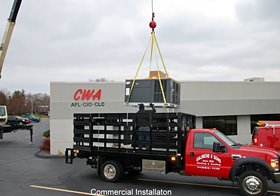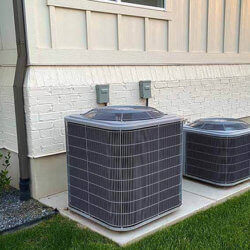
Freon is the refrigerant used by an air conditioner unit to absorb the heat from inside your home and carry it outside. Within the refrigeration industry, it is also known as R-22 coolant. This is a form of chlorofluorocarbon (CFC). Freon is actually a brand name, and is created by the company DuPont.
Freon has been identified as an ozone-depleting substance and is regulated by the Environmental Protection Agency. It is currently and slowly being phased out in accordance to the Montreal Protocol agreement.
However, many old air conditioners operating today still use Freon for cooling, and Freon leaks can be a major problem in these systems.
Causes of Freon Leaks
Here are the reasons why Freon leaks happen in your unit:
- Bad installation: People spend a lot on purchasing high-quality air conditioner unit, but fail to realize the importance of proper installation of said equipment as well. Make sure to hire an HVAC company that has a track record not only of successful repairs but also during the installations.
- Unit vibration: Poor handling of the unit and lack of proper maintenance can cause the machine to stress and vibrate. This can cause a puncture and allow Freon to leak out of the unit.
- Pollutants: If the inner coil of the AC unit is made from a copper tube, it can be corroded by air pollutants such as hair sprays and air fresheners, resulting in a leak.
- Physical damage: Something as innocuous as children playing, pets roaming around, and lawnmowers in motion may inadvertently hit the unit, causing a Freon leak.
- Age: Normal wear and tear can cause the walls of the copper tube to thin down. This increases the risk of Freon leaks occurring along the copper walls.
Signs of Freon Leaks
Watch out for these signs of a Freon leak in your air conditioner:
- It takes a long time for your house to cool down. Freon absorbs heat, so if your air conditioner contains only small amounts of it, it will automatically absorb less heat than usual.
- Your air conditioner consumes a lot of energy. If you notice a sudden spike in your energy bills even though you did not add a new electrical appliance to the home, consider having your HVAC system checked because this could be due to a Freon leak.
- Your air conditioner emits a hissing noise. Freon leaks can come from small punctures along the refrigerant lines. While it leaks out of the unit, it also emits a hissing sound.
Repair Solutions to Fix Freon Leaks

Here’s what your options are in case of a Freon leak:
- Add more refrigerant: If your unit is running low on Freon, you will have to replenish your system by adding more coolant to it. Take note that Freon is heavily regulated, so it is best to leave the replenishment to the professionals.
- Seal leakage: Since an air conditioning unit is a closed system, it does not consume or use up Freon so the saying that a Freon leak needs to be topped off year after year is a common misconception. Adding more Freon is only a temporary solution since the leak remains and often grows bigger until such time that the compressor is damaged. This is why you need to be suspicious when an HVAC professional keeps topping off your air conditioner system with Freon but does not bother to patch up the leak.
- Buy a new air conditioner: Since Freon is considered an environmental hazard, you might want to consider replacing your air conditioner with a new system that is environmentally friendly and energy-efficient. These new energy efficient air conditioning systems will be an investment now, but can save you lots on operating costs in the future.
If your air conditioner is not functioning properly, you can verify if it is caused by a Freon leak with the help of a heating and air conditioning company. In St. Louis, call the experts at Galmiche & Sons now at 314-993-1110 to learn more!









